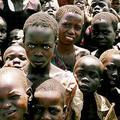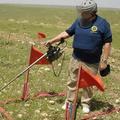 最近幾個禮拜,北烏干達境內陸續有7名兒童死於誤觸地雷意外,顯示烏干達政府軍和聖主反抗軍(LRA)20餘年的內戰,留下不少未爆危機。地雷,加上其他各式武器的威脅,厭倦戰爭的難民們,返鄉之路恐怕遙遙無期。
最近幾個禮拜,北烏干達境內陸續有7名兒童死於誤觸地雷意外,顯示烏干達政府軍和聖主反抗軍(LRA)20餘年的內戰,留下不少未爆危機。地雷,加上其他各式武器的威脅,厭倦戰爭的難民們,返鄉之路恐怕遙遙無期。
歐皮(Bonny Opio)在地雷意外失去4個孩子,他說:「我哪裡也不去,即使政府拆掉我們的難民營。」另外三個孩子是他的侄兒與姪女,他們自從歐皮的兄長在數年前死於內戰後,就由歐皮撫養至今。
北烏干達駐軍發言人阿基基(Captain Deo Akiki)認為這起意外是出於集束炸彈,而非地雷。4名孩童當場死亡,另外10名孩童重傷,其中3名送醫急救後不治死亡。
阿基基表示,這些孩童是在收集金屬廢料,用來回收掙錢時,遇上這起意外;他強調,收集未爆武器是相當危險的,而孩童卻認為應該無礙。
歐皮擔心倘若踏上返鄉之路,「我會像我的孩子一樣誤踩地雷而亡。」像歐皮這樣待在北烏干達200處難民營超過十年的,約有200萬人,而政府開始鼓勵他們重返家園。
 戰火似有歇息態勢。過去22個月,坎帕拉政府和聖主反抗軍已展開和平對話,雙方已草擬和平協議,只是尚未簽訂。
戰火似有歇息態勢。過去22個月,坎帕拉政府和聖主反抗軍已展開和平對話,雙方已草擬和平協議,只是尚未簽訂。
幾年來,聖主反抗軍都是以地雷切斷政府軍的尾隨攻擊, 此舉如今成為回歸和平的阻力;返鄉難民在重回家園展開新生活時,仍必須承擔戰爭遺留的風險,可能誤踩地雷或其他爆裂武器。
烏干達軍隊已開始搜尋和移除散落爆裂物。從反抗軍先前的大本營帕得德(Pader),沿著基特古姆(Kitgum)往北,都是未爆炸軍火密集處,特別在古盧(Gulu)和帕德區域交界的阿微爾(Awere)和東邊50公里處、帕德區之外的歐姆(Omot)。
聖主反抗軍領袖柯尼(Joseph Kony)原本預定在4月10日簽訂一項經過長期協商才草擬的和平協定,但他最後並未現身。此外,柯尼原定本週參與和平談判,以釐清協定中關於法律的相關議題;這場晤談應在上週末舉行,據報載,柯尼並未準時抵達議場。
與此同時,返鄉居民亟欲回歸原有的農耕生活。 「倘若雨水豐富,我們應有更好的收成。」離開聖主反抗軍卸甲歸田的歐西若(Ocere)說:「我們應該要可以自己養活孩子,而不是倚靠聯合國救援。」
The deaths of seven children in a landmine explosion in northern Uganda in recent weeks have highlighted the dangers still posed by unexploded devices left over from two decades of conflict between the Ugandan government and the rebel Lord's Resistance Army, LRA.
There are fears the risks posed by landmines and other weapons could slow the return of war-weary refugees to their villages.
"I'm going nowhere, even though our [refugee] camp has been dismantled by the government," said Bonny Opio, who lost four children in the blast. The three other children who died were his nieces and nephews, whom Opio had taken into his home after his brother died during the conflict a few years ago.
According to Captain Deo Akiiki, spokesman for the Ugandan army in the north of the country, the explosion involved a cluster-bomb rather than a landmine. He said four of the children died on the spot and 10 others seriously wounded in the explosion. Three of the 10 died later in hospital.
Akiiki said the incident occurred while the children were out gathering scrap metal that they hoped to sell to recycling companies. He underlined how dangerous this was, explaining how children pick up unexploded ordnance in the belief it is harmless.
Opio now worries that if he goes back to his village, "I will step on [a] landmine and die like my children." He is one of nearly two million people who have been living in the 200 refugee camps spread across the north for more than a decade, but are now being encouraged to return home.
The conflict has subsided as the Lord's Resistance Army and the Kampala government have been engaged in peace talks for the past 22 months. A peace agreement has been drafted but not yet signed.
The return to normality has been obstructed by the landmines the LRA rebels planted over the years of conflict, to prevent the army from pursuing them after their attacks. As people repopulate the villages and start working the surrounding lands, they risk setting off a mine planted there deliberately, or some other live explosive weapon left behind from the war.
The Ugandan army has begun an operation to find and destroy as much of the scattered ordnance as possible. The operation is concentrated in Pader, a former LRA stronghold which along with the town of Kitgum to the north has the biggest problem with unexploded ordnance. Some of the worst affected areas are Awere, on the administrative boundary between Gulu and Pader districts, and Omot, about 50 kilometers east of Awere, just outside Pader.
On April 10, LRA leader Joseph Kony was scheduled to sign a final peace agreement drafted during lengthy negotiations, but he failed to turn up.
Kony was expected to meet peace negotiators this week to obtain clarification on issues that have been incorporated into the peace agreement. The meeting was supposed to have taken place last weekend but the rebel leader was reportedly delayed in getting to the location of the talks.
Meanwhile, returning villagers are looking forward to planting their crops and returning to their old way of life.
"We hope if rains [do] well, we shall reap [a] better harvest," said Ocere. "We shall be able to feed our children out of our sweat, and not [rely on] the United Nations World Food Programme."
{This article originally appeared today in ICC Africa Update, produced by the Institute for War and Peace Reporting.}
全文及圖片詳見:ENS






